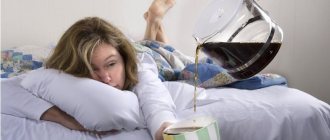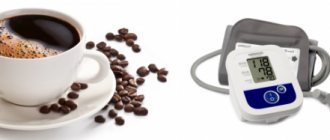For coffee lovers, the morning begins with a cup of aromatic and natural drink, the active ingredient of which is caffeine. It stimulates the central nervous system, helps boost energy, improves mood and speeds up brain function. On the other hand, this substance can cause anxiety, headaches, nausea, and increase blood pressure. The end result depends on how long the coffee lasts, how many cups you drink, and when you drink it.
Impact on the body
Basics
Caffeine, also known as mateine or guaranine, is a natural alkaloid that appears as white crystals with a rich bitter taste and no odor. In moderate quantities, it makes a person more resilient and efficient.
Every sip of coffee enters the bloodstream through the stomach. At this time, excitation and conditioned reflexes intensify, and motor activity increases.
Caffeine affects the brain, affects receptors and sends impulses to the body. As a result, a person feels energetic and cheerful.
Caffeine is found in cappuccino, latte, espresso and other drinks that are not based on coffee beans.
The alkaloid can even be found in decaffeinated liquid, as described in the article “What is Decaffeinated Coffee.” People with weak hearts and blood vessels, nursing women should take this fact into account.
Beneficial features
In small doses, caffeine relieves fatigue and drowsiness, increases physical and mental activity, and helps you get ready and concentrate on work.
The substance increases the frequency and intensity of heart contractions. For the cardiovascular system, this becomes a kind of gymnastics, and it gradually gets used to pressure changes. Therefore, coffee is the prevention of strokes.
Caffeine stimulates the production of secretions in the stomach and also helps to get rid of excess weight. The amount of free fatty acids in the blood increases. This stimulates metabolism, and subcutaneous fat burns faster.
The alkaloid increases muscle activity in athletes and helps withstand intense loads.
Guaranine increases the production of neurotransmitters in the brain. It has been scientifically proven that coffee lovers are less susceptible to the destructive effects of stress, are less likely to suffer from depression and are not prone to suicide.
Watch the dosage - do not drink more than 3-4 cups per day.
How many cups of coffee per day do you drink?
1-23-4
Coffee (will not) kill
Scientists have discovered a link between mortality and coffee consumption. People who drink a cup of coffee a day are 12 percent less likely to die compared to those who don't drink coffee. With each such statement, there are more and more questions about this drink. What does coffee contain? Does it really give you energy? Why do many people want to sleep after it? Revision N+1
Together with Torrefacto, I decided to understand the biochemistry of coffee and conduct an experiment - of course, on myself.
Coffee acts as a pain reliever, helps with muscle pain, and reduces the risk of liver cancer. In addition, an association was found between coffee consumption and the risk of type 2 diabetes in more than 25 cohort studies in America, Europe and Asia. The results of these studies show that coffee may reduce the risk of diabetes. It is also believed that coffee reduces the risk of developing Alzheimer's disease and can overcome Parkinson's disease.
Scientists argue and study, false studies are born and die, the sociocultural significance of the drink is growing. What is he? Coffee contains more than 1,300 different substances, although not all of them have been studied by science. To date, several groups of biochemical compounds that affect the functioning of the body have been identified. We will look at the main ones.
Coffee makes me happier
Caffeine is responsible for the tonic effect of coffee
is the most consumed psychoactive substance in the world. Caffeine stimulates the central nervous system, affects nerve cells in the brain, increases alertness and reduces fatigue. This is largely achieved by blocking adenosine receptors.
How it works? Adenosine is part of DNA, RNA, adenosine-3-phosphoric acid (ATP), and also plays an important role in biochemical processes, in particular in energy transfer. Adenosine interacts with adenosine receptors. They are found in almost all cells of the body and are responsible for inhibiting intracellular processes. There are four types of receptors: A1, A2A, A2B, A3.
Essentially, adenosine is a marker of fatigue. It gives signals when there is not enough energy in the cells, about being under stress, and warns that the body needs rest: “We are tired - it’s time to sleep.” Adenosine accumulates throughout the day. When tired and adenosine appears, the heart muscle begins to work weaker. You, in turn, feel tired. But if you block adenosine receptors, you can temporarily remove the subjective feeling of fatigue.
Adenosine is an adenosine receptor agonist, a substance that can bind to the receptor and produce a specific effect. But the main antagonists of adenosine receptors are various psychomotor stimulants. One of the most common and gentle forms is caffeine.
giphy.com
Share
Of course, caffeine itself does not carry energy, but thanks to it, the supply of ATP in cells is consumed much more intensively, that is, those molecules that release energy after breakdown. Caffeine blocks adenosine receptors, the feeling of fatigue disappears, cheerfulness comes, even an influx of strength. The body simply uses ATP reserves. During rest, ATP accumulates. If you do not restore these reserves, but continue to block adenosine receptors, over time the body will become exhausted - up to chronic fatigue and nervous disorders.
It also turned out that caffeine literally makes people happier - it increases dopamine levels. For example, according to a Harvard study, women who drank four cups of coffee a day were 20 percent less depressed than those who preferred other drinks.
Coffee makes me sleepy
The biggest controversy regarding the chemical composition of coffee has been around theobromine.
— because of a viral video from an independent expert. In eight minutes, he decided to debunk all the myths about coffee, revealing the connection between drowsiness and instant coffee. According to him, there is theobromine inside the coffee bean, and caffeine outside. And due to the peculiarities of processing, bean coffee contains both substances, while soluble coffee contains only theobromine, which, according to the lecturer, makes a person sleepy. The expert added that he drinks instant coffee in the evening to sleep better.
His seemingly convincing story was easily refuted. There are quite a few studies confirming that almost all theobromine is converted into caffeine during the ripening stage of the beans. Coffee contains the least amount of theobromine and is found mainly in cocoa, as well as small amounts in kola nuts and some types of hollies. So there is almost no theobromine in coffee. And there is caffeine in the instant version of the drink, so the soporific effect of coffee has not been proven.
Why then do you want to sleep? As stated above, coffee does not give energy, but only helps you take advantage of your own resources, which, of course, are not infinite. In addition, after some time the body's sensitivity to caffeine decreases, the brain creates additional adenosine receptors. So it's not bad coffee, it's just that your receptors have become less sensitive to caffeine.
How much can you drink
The recommended caffeine intake is no more than 400 milligrams per day. The amount of caffeine in a cup of coffee depends on several factors, including the temperature of the water, time and method of preparation (brewed, filter, espresso or instant).
According to research by Korean scientists, the caffeine content in a cup of coffee varies depending on the preparation method.
- The most caffeine is found in espresso - a serving of 30 milliliters. There are 60 to 100 milligrams of caffeine. When preparing espresso, finely ground beans are used. Due to this, the extraction of coffee upon contact with water is significantly accelerated.
- A cup of brewed coffee (100 milliliters) contains 70–110 milligrams of caffeine. The higher the temperature and the longer the drink is cooked, the more caffeine is extracted.
- Filter coffee (250 milliliters) typically contains 100–173 milligrams of caffeine. Australian studies have shown that pour over and French press extract the least amount of caffeine.
- Cold brew is coffee brewed using a cold method (not to be confused with iced coffee). It is infused for 8–24 hours at room temperature or in the refrigerator. According to a study by Canadian scientists, 12 ounces of this coffee (approximately 355 milliliters) can contain from 153 to 238 milligrams of caffeine.
- Instant coffee typically contains less caffeine than brewed and filtered coffee. A standard serving of instant coffee (200 milliliters) contains approximately 40–65 milligrams of caffeine.
It is also worth considering the type of coffee. According to a 2016 study published in the journal European Food Research and Technology
, the average caffeine content of Robusta is approximately twice that of Arabica. Scientists found that per kilogram of dry coffee, Arabica beans contain 34.1–38.5 grams of caffeine, and Robusta beans contain 68.6–81.6 grams of caffeine.
A week without coffee. What's happening?
We decided to conduct an experiment at the editorial office: deprive ourselves of coffee for a week. How (not) easy were these seven days for our colleagues?
We selected four volunteers, with an average age of 25–30 years. Typically, each of them drinks two to five cups of coffee per day. Most people prefer ground coffee (we have a coffee-friendly edition with a coffee machine and a French press, and now also a supply of beans from Torrefacto).
Our task is to find out how soon after giving up coffee the symptoms of withdrawal symptoms will be noticeable. That is, the appearance of headache, fatigue, drowsiness, irritability that occurs in some people after reducing the dose of caffeine.
Share
As the experiment showed, these symptoms appear on the first or second day. Withdrawal symptoms from quitting coffee reach their peak on the fourth or fifth day.
The majority of respondents did not note the appearance of fatigue after waking up, but they honestly admitted the desire to lie down and sleep in the middle of the working day. Productivity has also decreased significantly.
In addition, the experiment participants did not notice any feelings of anxiety or the appearance of irritability. But they found that the number of trips to the kitchen for food increased significantly.
Why is this ok
After stopping caffeine for 12 to 24 hours, withdrawal symptoms may occur: fatigue, restlessness, difficulty concentrating, and drowsiness. After a few days, these symptoms disappear.
For example, headaches are caused by caffeine consumption constricting blood vessels in the brain and slowing blood flow. When caffeine stops flowing, blood vessels open and dramatically increase blood flow to the brain.
By the way, you can prevent unpleasant consequences: gradually reduce the amount of coffee, drink more water and sleep more, and exercise in the morning.
Share
Against free radicals
Coffee is rich in antioxidants: these include, first of all, phenolic acids. For example, chlorogenic acid
(has nothing to do with chlorine).
Light and medium roasted coffee contains the most of it. Chlorogenic acid has a weak psychostimulant effect, about one-third the potency of caffeine. Indirectly (through the production of hormones and activation of receptors) can increase blood pressure, reduce anxiety and accelerate fat burning. According to research by Chinese scientists published in Nature Communications
, this occurs by stimulating metabolic energy expenditure and suppressing appetite.
Moreover, antioxidants influence oxidation processes in the body, fight free radicals (aggressive molecules), thereby preventing various diseases. Free radicals (due to a free electron) combine with cell particles, DNA or proteins, damage them, and affect changes in the DNA structure of cells.
The ability of coffee to fight free radicals due to the presence of antioxidants has been confirmed by Australian and Korean studies. The effect of one cup of coffee is equivalent to 590 milligrams of vitamin C. For many people, coffee is almost the main source of antioxidants.
However, chlorogenic and other acids in coffee can harm people prone to gastrointestinal diseases. For example, cause acid reflux, stomach ulcers or irritable bowel syndrome. In addition, coffee is not recommended for people with heart disease and pregnant women.
The benefits of coffee also depend on the method of its preparation: in coffee brewed using traditional hot methods (using hot water), the activity of antioxidants is higher than in cold brew (brewed in a cold way). As noted in an article published in Scientific Reports
, the acidity of cold and hot drinks is approximately the same, so most likely this property depends on the temperature of the water used to prepare the coffee.
Friend or drug
The content of vitamins and minerals in coffee varies depending on the variety, where it is grown, the processing method and even the crop protection products used.
The drink is rich in B vitamins, especially nicotinic acid.
(vitamin B3).
But studies have shown that coffee does not affect the final content of vitamins in the body: apparently, they are washed out in the urine. Coffee also contains potassium
,
magnesium
,
calcium
, and
iron
. But their number is relatively small.
According to research, caffeine, one of the most studied bioactive components of coffee, promotes the leaching of calcium from bones (albeit slightly), negatively affects calcium balance, increasing calcium excretion, reducing its absorption. However, a study published in The Journal of Clinical Endocrinology and Metabolism
, showed that people who drink coffee may have higher bone density than those who don't drink it.
Coffee also contains trigonelline
- an alkaloid that has antidiabetic, neuroprotective and antibacterial effects. It is relatively abundant in Arabica, less in Robusta and almost none in Liberica.
Cafestol
- according to Danish scientists, it can improve insulin secretion. Its mechanism of action is similar to antidiabetic drugs. Experiments on rats and fruit flies showed the anticarcinogenic and neuroprotective properties of the substance.
Melanoidins
— are responsible for the brown color of the beans and the texture of the drink. They have a probiotic function and help the growth of beneficial intestinal bacteria.
Coffee contains a huge amount of nutrients we need. Carbohydrates
impart viscosity and a hint of sweetness, which is responsible for glucose and fructose. Carbohydrate compounds make up up to 60 percent of the mass of green coffee beans. But during the roasting process, most of them decompose.
Lipids
form the texture of brewed coffee. These are organic compounds that include fats and fat-like substances. They do not increase the calorie content of coffee, since they are either lost during filtering of the drink or remain in the sediment. In addition, scientists from the University of Illinois at Urbana-Champaign conducted a study and found that caffeine reduces the level of lipid accumulation in fat cells, and as a result, helps control weight gain.
Proteins/proteins
, which are made up of amino acids.
The maximum nutrient content of coffee is:
- Proteins: no more than 0.1 grams.
- Fats: no more than 0.6 grams.
- Carbohydrates (including sugars): no more than 0.1 grams.
Often the amount of carbohydrates is close to zero.
From all of the above, it turns out that, in general, coffee has a positive effect on the body, but with moderate consumption (and do not forget about the restrictions and contraindications).
This drink improves memory, elevates mood and improves overall cognitive function. So coffee is that rare case of combining business with pleasure. Natalia Luchkina
Denver experiment
The essence of the study
The Denver experiment was conducted in 2021 at the Congress of American Somnological Societies. The purpose of the study is to dispel the myth that coffee saves you from insomnia.
Interesting! How to drink coffee without staining your teeth
A group of 48 volunteers was formed. During the week before the convention, they slept 10 hours a day. Then, over the course of 5 days, sleep duration was reduced to 5 hours. During the experiment, people were given a placebo or 200 mg of caffeine twice a day - a dose that is equal to two cups of strong coffee.
The subjects were tested regularly. Scientists checked their reaction speed, degree of drowsiness and mood. Those who took caffeine had the best results. However, after three nights the indicators deteriorated sharply. People were more tired and irritable than those who did not take this substance.
results
The results of the experiment proved that caffeine is not a panacea for sleep deprivation. It is enough to sleep less than usual for three nights, and its effect weakens.
It's all about the increased concentration of adenosine, which is responsible for transmitting energy and signals to the body. When this neurotransmitter binds to receptors, a person begins to feel drowsy.
Expert opinion
Vadim Kudryavtsev
Coffee expert, professional barista and simply in love with this aromatic drink.
Ask the barista a question
Caffeine temporarily blocks adenosine, but does not replace proper sleep. Before a hard week of work, you need to sleep 2-4 nights for 10 hours. This trick will help you replenish your sleep reserves and maintain efficiency and energy for as long as possible.
Acceptable rate
The upper limit of caffeine intake is 500 mg per day. This figure is valid for a completely healthy adult with normal weight. A single dose should not exceed 200 mg. A minimum of 3 hours should pass between doses.
How many times a day can you drink coffee without harm to your health? If we take Arabica espresso as an example, then 1 standard 30 ml serving is approximately 50-70 mg of caffeine. Therefore, you can drink up to 7 such cups per day. A large cup of cappuccino, which tastes much smoother, is two espressos.
It is easy to exceed your daily coffee intake if you drink it from Turkish coffee. Usually about 200 ml is brewed per person, using 2 teaspoons of ground coffee. As a result, a cup contains an average of 130 mg of caffeine. It is not recommended to brew stronger and consume more than 3 times a day.
The instant product also contains quite a lot of caffeine: 100 mg per 2 teaspoons.
Coffee fans can be offered the following safe coffee “diet”: in the morning - double espresso or Turkish coffee, in the afternoon - cappuccino or macchiato, in the late afternoon, but no later than 4 hours before bedtime - latte. In total, you get about 350 mg of caffeine per day, which will not harm a healthy person.
But you shouldn’t always drink 7-8 cups of espresso. If you drink coffee every day, it will be difficult to give it up later: an addiction will form.
- Read more: Consequences of coffee addiction
Table of caffeine content in coffee drinks
| Drink, ml | Amount of caffeine per 100 g/serving, mg | Harmless daily dose, ml | Maximum permissible dose, ml |
| Espresso, 30 | 160 – 220/50 – 70 | 100 – 150 | 250 |
| From Turkey, 200 | 65/130 | 300 – 400 | 800 |
| From French press, 200 | 40/80 | 500 | 1000 |
| Cappuccino, latte or macchiato based on 2 espresso shots, 200-300 | 50 – 60/100 – 140 | 400 – 500 | 1000 |
| Instant, 200 | 40/80 | 500 | 1000 |
How long does the effect last?
The half-life of caffeine lasts up to 5 hours. Within 15-45 minutes after drinking a cup of coffee, people experience an energy boost, their mood improves and their performance increases.
In a relatively short period of time, a person manages to do a lot of things, his brain is actively working and generating fresh ideas and thoughts.
Once the caffeine begins to break down, your symptoms will go away. Euphoria may be replaced by a loss of strength, an attack of drowsiness and increased irritability.
If you drink coffee frequently, your body will begin to develop a tolerance to caffeine and your symptoms will not be noticeable. For some people they last longer than for others. There are no clear deadlines - it all depends on your health status, weight, age and dose.
Three stages of sensitivity
On average, coffee begins to affect our body within 30-45 minutes. But each person is individual, so the timing may change. People have different sensitivity to caffeine. Scientists distinguish three stages.
Interesting! How to hold a coffee stick correctly
Hypersensitivity: The body reacts sharply to even minimal amounts of caffeine. A dose of 100 mg or less may become critical.
Normal sensitivity: such people can consume from 200 to 400 mg of the substance per day without harm to their health.
Reduced sensitivity: observed in 10% of people. For them, 500-700 mg is a safe daily dose. There are no side effects, even if you drink the drink at night.
Sensitivity is affected by age-related changes in the body, the state of the cardiovascular and nervous systems, as well as body weight.
What is your caffeine sensitivity?
NormalReduced
Is it possible to put coffee back into the capsule?
The capsule contains regular ground coffee, and therefore the question often arises: is it possible to somehow pour regular coffee into it and will the drink be prepared? This cannot be done with regular standard capsules. But some manufacturers produce special reusable capsules into which you can pour a portion of ground beans, carefully remove the excess, close the lid and put it back into the coffee machine.
One reusable capsule can be used more than 50 times, then the membrane begins to deteriorate.
Reusable capsules for coffee machines are produced by Nespresso, Lavazza, Tassimo, Dolce Gusto, and some less famous manufacturers. Therefore, if you are just choosing a coffee machine and plan to save on capsules, you should choose one of these options.
Another important advantage of reusable capsules is the ability to add any coffee you like. Manufacturers usually offer a fairly limited selection of drinks, and sometimes you want something special, for example, special varieties or flavors. You can put whatever you want into a reusable capsule, add spices to your coffee or grind exclusive beans. Overall, it's tasty and convenient.
From vigor to addiction
One step will help you get the maximum effect: drink a cup of coffee 30 minutes after eating, and then take a nap for 15-20 minutes. This is called caffeine sleep.
How the body absorbs caffeine depends on the type of drink. More substance is found in brewed natural coffee and espresso. Lower concentrations are in instant.
Find out more in the article “How much caffeine is in a cup of coffee.”
If you exceed the dose of caffeine, you can expect consequences. Instead of a stimulating effect, the functioning of the nervous system is disrupted. In some cases, caffeine addiction has been reported.
Why is espresso the leader in caffeine content?
After considering all the factors, we found that there are a number of reasons why espresso extracts the most caffeine.
First of all, it’s about the finest grinding, compared to other methods.
For espresso, the grinding degree used is finer than extra salt, but slightly coarser than “dust”).
Thanks to this grinding, the area of contact between coffee and water increases, and therefore caffeine extraction is accelerated.
Other important factors that speed up the caffeine extraction process are water temperature and cooking time. At higher temperatures and therefore longer cooking times, more caffeine is extracted from the beans.
Espresso contains the most caffeine
When it stops working
Now let's find out how long coffee lasts. This depends on the characteristics of the body and the period of decay of the active ingredient.
Once caffeine begins to break down in the body, its effects weaken. On average, half-life occurs in 5 hours. If 40 mg of a substance enters the body, then after 2-3 hours 20 mg will remain, and after another 2-3 hours it will completely disintegrate.
Over time, resistance to the active substance develops.
If you drink coffee daily, its severity and duration of impact are reduced. The drink will not give the same vigor as before. And even this effect will be short-lived.
When does a cup of coffee take effect?
Coffee affects every body differently. Its effect depends on a combination of factors:
- brewing strength
- volume of drinks
- human weight
- stomach fullness
- human physical activity
The effect of drinking coffee does not begin immediately. Interestingly, doctors recommend drinking a glass of plain water after drinking a cup to dissolve the caffeine concentrate in the body. And then after half an hour a person will feel the expected effect:
- mood improves;
- concentration of attention increases;
- brain activity increases;
- the level of observation also becomes high.
Consequences
When the invigorating effect completely disappears, caffeine tolerance appears within a few days: from 1 to 4. This condition is dangerous. Trying to cheer up, a person will increase the dosage. This will lead to the following consequences:
- increased nervous excitability;
- stomach pain;
- severe diarrhea;
- heart rhythm disturbances;
- breathing problems;
- uncontrollable anxiety attacks;
- sleep disorder;
- lethal: 5 to 10 g of caffeine (up to 15 cups of coffee) over 5-8 hours is considered fatal.
Interesting! How many cups of coffee can you drink per day?
Who shouldn't
Reducing or eliminating the consumption of coffee drinks is necessary for people who suffer from:
- severe sleep disorders;
- nervous excitability;
- atherosclerosis;
- problems with the musculoskeletal system – calcium is quickly removed from the body;
- liver and kidney diseases;
- hypertension;
- glaucoma;
- pathologies of the cardiovascular system;
- polycystic diseases - caffeine stimulates the growth of tumors.
Doctors also recommend that breastfeeding women give up coffee or reduce its consumption. Caffeine enters the baby's body through breast milk and makes him restless and irritable. The child will have problems sleeping in the future. You need to wait at least 3 hours between a cup of coffee and feeding.
Removing caffeine from the body
Milk in coffee softens the harmful effects on the body.
Caffeine acts from 2 to 7 hours, depending on the dose taken. Residues of the substance can remain in the body for up to 8-14 hours. It should be borne in mind that women need a little more time to completely eliminate caffeine from the body than men.
Drinking plenty of liquid will help reduce the level of the substance. Regular drinking water removes caffeine through the kidneys. In addition, it is possible to reduce the effect of coffee on the body in advance by adding milk or cream or ice cream to the drink during preparation.
How does coffee affect sleep?
The effects of caffeine may last throughout the day. Sometimes this leads to sleep problems. A person may not sleep well or not sleep at all.
Adults and healthy people can drink 1 to 3 cups of espresso without consequences. The optimal amount of caffeine is determined independently, depending on the individual characteristics of the body.
Expert opinion
Vadim Kudryavtsev
Coffee expert, professional barista and simply in love with this aromatic drink.
Ask the barista a question
People who have problems sleeping should not drink coffee in the evening. Yoga classes and special breathing exercises will help minimize the effects of caffeine. Having developed a clear sleep pattern, you can refuse additional stimulants.
Check out other features in the article “Can I drink coffee at night.”
Duration of effect on different categories of people
There is no specific time limit. The duration depends on the dose, age and weight. The average period during which the effects of caffeine wear off is considered to be 4-5 hours. It's also worth considering other products that contain caffeine.
The effect of coffee on the male body
If you consume natural coffee excessively over a long period of time, this can lead to a decrease in the activity of the male sex hormone testosterone due to “false” energy generated due to caffeine, which is a diuretic. A
surge of energy occurs, the intensity of metabolic processes increases, and the level of physical activity increases. Abuse of the drink will negatively affect potency and mood.
The effect of coffee on a woman's body
Pregnant women should be especially careful with the strength and quantity of coffee.
By drinking 6 cups of coffee a day, women can reduce the risk of diabetes by a third. Caffeine also helps you lose extra pounds. But you should not drink coffee during pregnancy. If you drink 4 cups of an invigorating drink, the risk of baby death in the womb increases by 33%.
Adult reaction to coffee
The reaction of the adult body to coffee is most often positive, if you do not overdo it with the amount you drink. It is worth paying attention to the individual characteristics of the body. Considering the average dose of 2-3 cups, there will be more benefit than harm.
The effect of coffee on children
If for adults a certain “dose” of activity and strength is sometimes simply necessary, then the child’s nervous system (still at the stage of development) may experience overstimulation from coffee.
Children should be allowed to try coffee with extreme caution. Coffee removes calcium from the child’s body, which is so important for a growing body. This will lead to problems with bone formation and poor heart function. Also, the effects of drinking coffee will be visible during puberty. A teenager may experience deviations in the form of memory impairment and increased nervous excitability.











